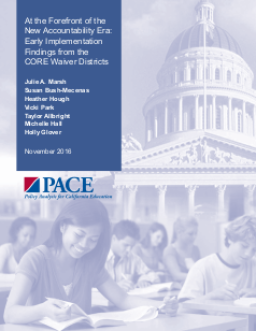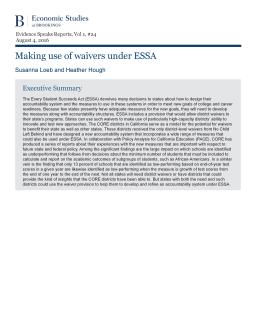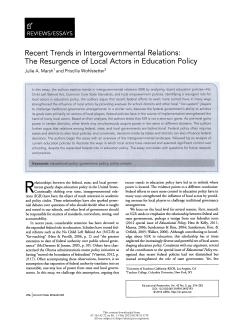Published
Summary
The Every Student Succeeds Act (ESSA) allows states to reshape their school accountability systems. One dominant model is the letter-grade system first adopted by Florida, while California is developing a dashboard-style system that encompasses multiple measures such as student attendance and school climate. Former Florida Governor Jeb Bush presents the case for summative ratings, while Heather J. Hough and Michael W. Kirst of PACE stress the importance of multiple measures.
Insights From California’s CORE Waiver Districts
Published
Summary
California's Local Control Funding Formula (LCFF) aims to improve educational equity by providing additional funds to districts with disadvantaged students. Districts are required to engage with their communities and develop Local Control Accountability Plans (LCAPs) to identify priorities and allocate funds. However, there are concerns about the quality of LCAPs, lack of stakeholder involvement, and limited transparency. To improve the effectiveness of LCFF, districts must ensure meaningful stakeholder engagement and use data to guide decision-making.
How a Research Center Based at USC Rossier, Stanford and UC Davis Is Helping California Forge Its Own Path in Advancing Its Education System
Published
Summary
Policy Analysis for California Education (PACE) is a consortium of researchers, policymakers, and practitioners from USC Rossier, Stanford, and UC Davis Schools of Education working to improve education policy in California. PACE's focus has been the Local Control Funding Formula (LCFF), which changed the state's K-12 budget allocation. The consortium's strength is in its ability to get research into the hands of decision makers, especially in Southern California, where over a quarter of the state's K-12 students reside.
Learning from the CORE Districts' Focus on Measurement, Capacity Building, and Shared Accountability
Published
Summary
California and the US are undergoing a cultural shift in school accountability policies towards locally-determined measures of school performance. Lessons can be learned from the CORE districts, which developed an innovative accountability system, emphasizing support over sanctions, and utilizing multiple measures of school quality. The CORE districts' measurement system and collaboration hold promise for improving local systems, but efforts to build capacity remain a work in progress.
Published
Summary
ESSA allows states to design accountability systems and measures to meet new college and career readiness goals. With the lack of adequate measures, states will need to develop new measures and structures. The CORE Districts in CA, with its innovative accountability system and waivers from No Child Left Behind, is a model for other states. Reports from CORE-PACE highlight the impact of decisions such as subgroup sizes and test score growth on identifying low-performing schools. States can use the district waiver provision to help develop and refine their accountability systems under ESSA.
The Resurgence of Local Actors in Education Policy
Published
Summary
This article analyzes recent education policies to explore trends in intergovernmental relations. The authors argue that federal efforts to exert more control have actually strengthened the influence of local actors, creating a bidirectional relationship between federal, state, and local governments. Local actors have retained and asserted significant control over schooling, despite the expanded federal role in education policy. The article concludes with questions for future research and practice.





